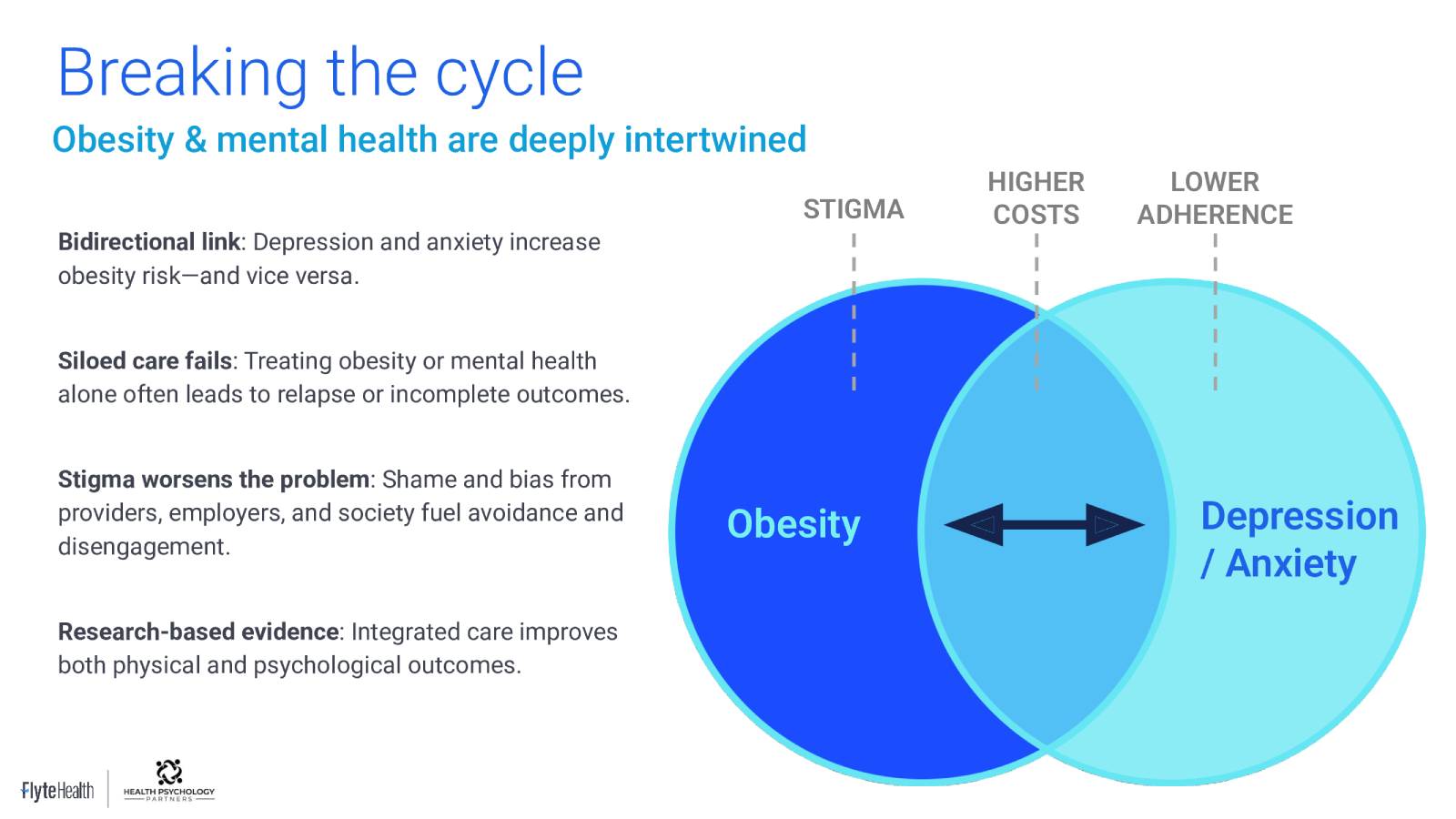In This Post:
Presenters:

Dr. Katherine H. Saunders
Cofounder, FlyteHealth

Dr. Robyn Pashby
Founder & Director, Health Psychology Partners
Obesity and mental health rank among the top concerns for employers that want to provide meaningful, measurable health solutions. Yet these issues are often treated in isolation, which can be a costly oversight. What if the key isn’t prioritizing one over the other, but addressing both in an integrated, coordinated way?
On May 28, FlyteHealth hosted a thought-provoking webinar that challenged the fragmented way most organizations approach employee health. This discussion invited us to rethink how to evaluate weight management and mental health programs, and how integrated care can provide better outcomes, lower costs, and greater employee engagement.
The session was led by Dr. Robyn Pashby, Founder of Health Psychology Partners, and Dr. Katherine H. Saunders, Co-founder of FlyteHealth. Together, they addressed the systemic gaps in how obesity and mental health are typically addressed in the workplace and why solving them in silos perpetuates the problem.
About FlyteHealth
FlyteHealth is a nationally recognized virtual care provider specializing in the treatment of obesity and related chronic conditions, including prediabetes, type 2 diabetes, hypertension, hyperlipidemia, and more. Through a precision-based, evidence-driven approach, FlyteHealth delivers customized cardiometabolic care that integrates evidence-based obesity medicine, chronic condition management, and both GLP-1 and non-GLP-1 pharmacotherapy.
The care journey begins with a clinical intake, including lab work, screenings, and virtual consultations with a physician and dietitian. Patients receive ongoing, personalized support through a mobile platform, guided by a multidisciplinary team of board-certified obesity specialists, focused on medication management, nutrition, physical activity, and sustainable lifestyle change.

Understanding the Hidden Cycle: Obesity and Mental Health
The webinar opened with a powerful truth (one that many intuitively understand but few systems are built to address): obesity and mental health are deeply intertwined. Decades of research confirm that depression and anxiety significantly increase the risk of obesity, and vice versa. Individuals living with obesity face a higher risk of developing depression, while those with depression are more likely to experience weight gain due to changes in metabolism, stress hormones, and coping behaviors such as emotional eating.
Despite this clear bidirectional link, most care models treat these conditions independently. But treating weight without addressing emotional and psychological factors is like “cutting the weeds without ever pulling up the roots”. It often leads to fragmented care, incomplete outcomes, and disengaged employees.
What’s Really Preventing Progress?
Weight stigma remains widespread in the workplace and often comes at a cost. Employees facing bias from providers, managers, or even benefit design are less likely to seek support, adhere to treatment plans, or stay engaged in programs. Internalized shame undermines motivation, while external judgment erodes trust.
Many well-meaning employer programs inadvertently reinforce that stigma, focusing on pounds lost, while overlooking mental health support and the need for safe, inclusive environments.

GLP-1s Are Not a Standalone Solution
While GLP-1 medications are transforming the obesity treatment landscape, they are not a silver bullet. The data is clear: people who receive GLP-1s without behavioral support are more likely to discontinue treatment, fail to sustain weight loss, or experience relapse once the medication ends.
Research consistently shows that integrated behavioral support is essential to maximizing the benefits of pharmacotherapy. Without it, people who need support may miss out on the mindset, habits, and coping strategies necessary for lasting change.
Behavioral health is what turns initial progress into lasting change.

A New Framework for Employer Success
When mental health is the starting point of obesity care, everything improves. This is one of the most powerful insights from the session.
Trauma-informed, compassionate, and clinically integrated programs lead to better engagement and produce real clinical results. Many sources show that integrated care models lead to significant improvements in both physical and psychological outcomes compared to single-condition interventions.
FlyteHealth’s model is rooted in this evidence. It treats the mind and body together through a virtual-first platform, led by a multidisciplinary team of experts in obesity medicine, psychology, nutrition, and lifestyle coaching.
When you treat people, not just symptoms, change becomes sustainable.
Here are three actionable strategies for organizations looking to address the full picture of employee health:
- Start with Mental Health
Reframe obesity treatment as a mental health journey. Support programs that integrate therapy, coaching, and psychological safety from day one. - Choose Integrated, Virtual Care
Avoid fragmented point solutions. Choose partners who offer seamless access to both obesity medicine and behavioral health under one umbrella, like FlyteHealth. - Track the Right Outcomes
Go beyond pounds lost. Evaluate medication adherence, comorbidity reduction, program engagement, and the psychological readiness of the population.

Get in touch with FlyteHealth today!
FlyteHealth’s approach is designed for results that matter. With a virtual-first platform, a dedicated clinical team, and a thoughtful, evidence-based approach to medications, they’re helping organizations cut costs while actually improving employee lives.
FlyteHealth collaborates with employers, health systems, payers, and PBMs to improve access to high-quality care, enhance clinical outcomes, and drive measurable cost savings across all 50 states. By addressing the full spectrum of cardiometabolic health, FlyteHealth enables organizations to reduce chronic disease burden, support employee well-being, and achieve long-term clinical and financial success at scale.
If your organization is ready to move beyond fragmented solutions and create real change – FlyteHealth is a partner worth knowing.
Contact FlyteHealth today.
For more information, contact:
Dr. Robyn Pashby – rpashbyphd@healthpsychologypartners.com
Liz Joyce – liz.joyce@flytehealth.com
In case you missed it: Log in to access the full Meet A Vendor Presentation!
Not a subscriber? Request access.
Did you find this article interesting?
Don’t keep this knowledge to yourself – share it on your social media channels and spark engaging conversations!
